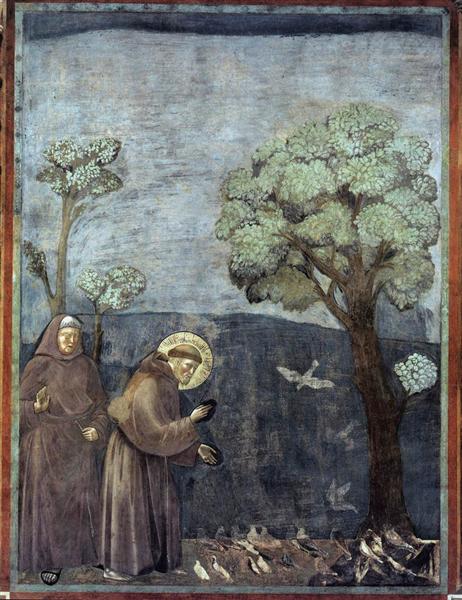Five years ago, Pope Francis issued a most remarkable text, an encyclical unlike any that precedes it because it is addressed to all people of goodwill and because it confronts a matter of grave concern, which is the wellbeing of the creation itself. Laudato Si’ is also remarkable in taking as its starting point that great hymn of St Francis, the Canticle of the Creatures, with its opening words as the title of the encyclical in the medieval Italian of the troubadour rather than the formal Latin of the academy. He has invited people everywhere to reflect on this text over the last week and, if you’ve not yet had the chance to read it, it’s easily available for free online. It’s far more than just a call to action in respect of the steps we all must take to protect the integrity of the creation. It’s also, and perhaps above all, a call to see the creation differently, not as stuff to be consumed by us greedy humans but as an intricate whole of which we are a part, a vibrant, living system that proclaims the love of its Creator, and invites the grateful praise of its articulate creatures.

If all of this seems like an intrusion into the liturgical cycle, just as it approaches its Paschal climax at the great Festival of Pentecost, I would like to suggest that it unquestionably belongs here, at this pivotal point between Ascension and Pentecost. In the Ascension of Christ, we may appear to be telling a story of his being taken away from the earth, but what is actually going on is rather different. Far from indicating a removal from the created realm, Jesus’ ascension reveals the nature of his presence in the world. He may not be obviously available to our usual way of recognising another person in the narrative flow of history, but his presence is no less real. Indeed, his ascension reveals that he fills all things. John’s Gospel makes it clear that Jesus must go from his disciples in order to be present with them and within them in a different way. But it’s not really a new way. God’s creative presence in his creation was there from the start.
I think we’ve got too used to thinking of creation as a process of production – you make something and then forget about it, letting it do its own thing. You get the stuff together, make it into something else, and set it on its course. But biblical insight offers a much more dynamic picture than that. Think of that most eloquent Psalm of creation, Ps 104, which is recited every single evening in the Orthodox service of Vespers. In verses 29 and 30 it says:
You hide your face, they are dismayed; you take away their breath, they die, returning to the dust from which they came. You send forth your spirit, and they are created, and you renew the face of the earth.
Creation is not a machine. It is alive, and its very life is dependent on the sustaining love of God who breathes his life into it from moment to moment. God’s very presence energises all that lives. Nothing is inert, nothing is static, the whole creation hums with the energies of God, charged, as Gerard Manley Hopkins said, with the grandeur of God. He went on to speak of the Holy Ghost brooding over the curve of the earth with warm breast and bright wings. The earth lives because the living God sustains it in life.
What the Ascension of Christ reveals to us is that this loving, sustaining presence is none other than the presence of the one who healed the sick, welcomed the outcast and dined with sinners. There is, then, an intimate connection between our love for the marginalised and the suffering, and our love for the pulsing, energetic, diversity of creation. God, who is present sustaining all life, is God who binds up wounds, God whose wounds we bind when we tend the needs of the weakest. We care for creation because God is in it. We care for creation because God is in us. We cannot be indifferent to life. We care because we love, because we desire the fullness of life for all.
If climate catastrophe is to be averted, it is unlikely that we will achieve what must be done through political calculations alone. Without passionate love for creation, will we truly find the motivation to change the way we live? Without a true conversion towards the very stuff of the earth, will be able to move away from seeing ourselves as consumers and begin to see ourselves as brothers and sisters of all that lives? This current crisis of a pandemic, caused by our carelessness with the creation, offers an opportunity to refresh our awareness of the intimate connections we share with all that lives, and to do so with a deepened compassion. Our lockdown has caused us to look again at what we really need to live well and to appreciate the small things. Our awareness of the sufferings of others has caused us to see again the impact of our actions on others. Our sense of fragility has opened up to us the opportunity to delight in the freshness of each new day, the vibrancy of each budding flower or passing bird. And at this time when we look in vain towards heaven for the ascended Christ, we are invited to open our eyes and see him in every living molecule. As we await the coming of the Spirit, we embrace life with every breath and give thanks for the one who breathes it into us. ‘Bless the Lord, O my soul! O Lord my God, how great you are, clothed in majesty and honour, wrapped in light as with a robe!’
